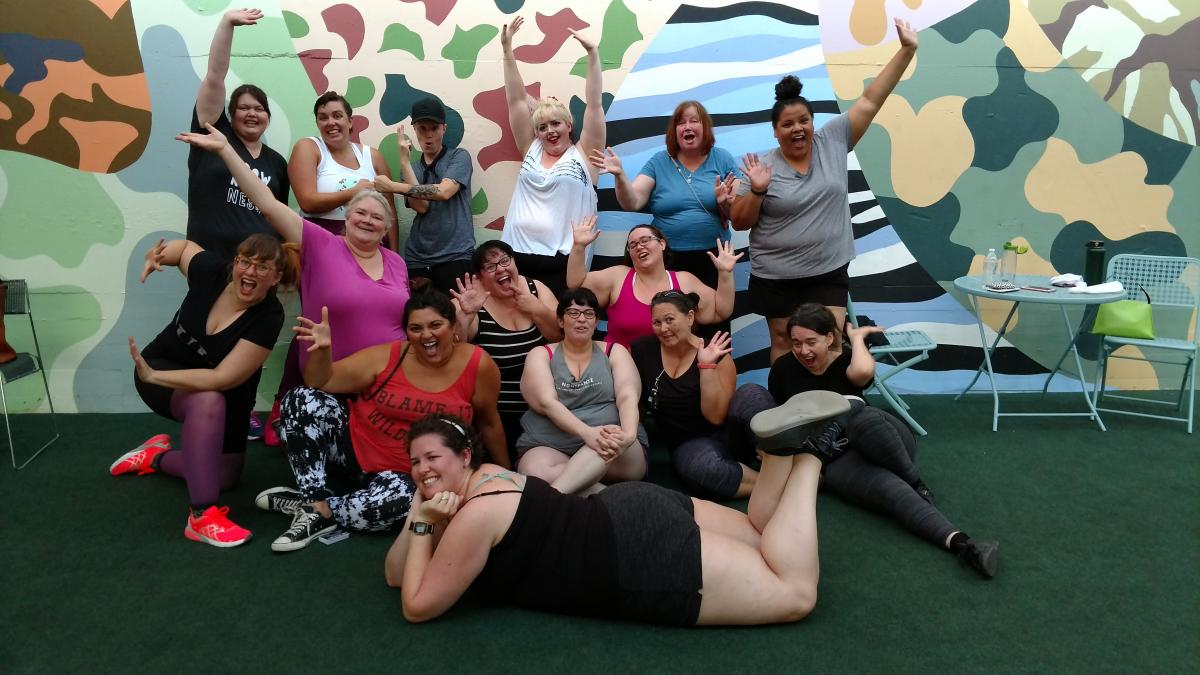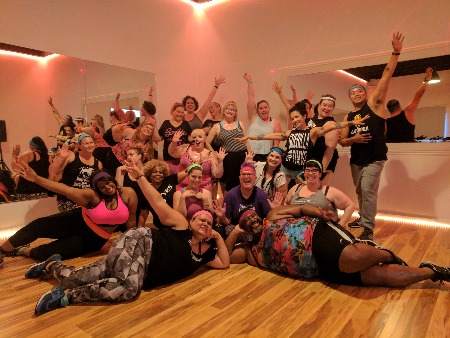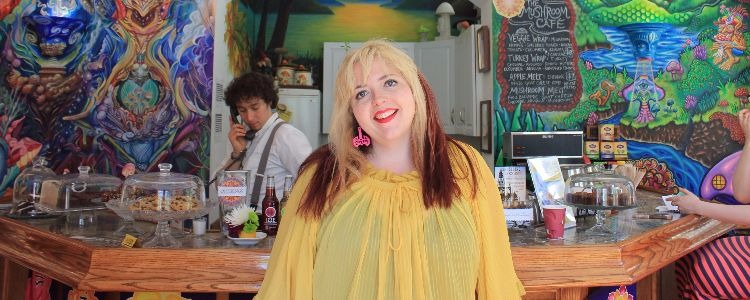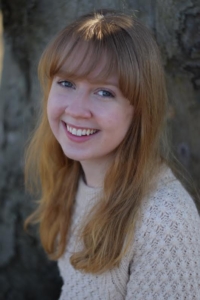“Fat Kid Dance Party” is a Safe Space Where Every Body Can Bust a Move
Fitness culture is generally pretty exclusive: it thrives on fatphobia and the appearance ideal. There is generally an apprehension of participating in gym and fitness culture if you don’t look a certain way, but working out should give you a boost of confidence and allow you to appreciate your body for all it can do. Bevin Branlandingham has developed Fat Kid Dance Party: For All Sizes to Heal from Body Oppression, which is hosted by EVERYBODY gym in Los Angeles. Bevin’s class and this gym welcome people of all sizes, races, genders, and physical abilities. We had a chance to talk to Bevin about the creation of Fat Kid Dance Party and why this type of class is so pivotal in the body positivity movement.
Grace Bradley: How did you develop Fat Kid Dance Party?
Bevin Branlandingham: I drew from years of performance experience as a drag king/queen, burlesque performer, and femmecee. I thought through what I enjoyed doing while dancing and in aerobics classes and created a huge mash-up of things that brought me joy.
I also knew setting up class norms that created a safe(r) space for people to bust a move was super important. I had a lot of inspiration to make up my “rules,” including Queer Memoir from NYC. It’s a great home for first time storytellers, and if a storyteller says they feel nervous on stage everyone cheers for them. I did that for awkwardness because I know feeling awkward makes people feel hesitant to dance in public.
GB: What do you do to create a body positive and accepting environment in a place where many people feel vulnerable?
BB: The rules for class set-up a safe(r) space for folks to step out of their comfort zone. I make sure there are chairs available, so folks who need to are welcomed to take breaks or work out in a chair. I make sure folks who want to raise their cardio level beyond what I’m doing have variations as well. I think reaching out to people no matter where they are at with your teaching is super important to making people feel welcome.
I don’t talk about goals in any way. The only goal I have for my students is that they dance and have a good time. It can be super alienating to your students if you prescribe goals to them that indicate their body isn’t good as it is. I don’t talk about weight loss (the first and foremost rule of being body positive) and I don’t talk about strength or beasting or whatever other language people use.
I think a lot of instructors and trainers assume people are there with weight loss and strength goals, but I know that there are a lot of reasons people come to a movement class. Moving is the first reason, but also mental, emotional, spiritual, and physical health are part of the equation. When I go into a fitness modality I’m not looking to lose weight or change my body, and I find it very off-putting when an instructor makes assumptions about what I want out of a dance class. It’s totally okay to have weight loss or strength goals, body autonomy is important, but I think being neutral about bodies is very important if you want to have a positive impact on people of all shapes and sizes.

GB: Do you remember your first Fat Kid Dance Party class? What was running through your mind?
BB: It was only five months ago! I remember it clearly. I was trying to remember all of my choreography (and still had notes for all of my numbers in a Dolly Parton folder next to my water bottle). I was trying to make sure I had variations for people to do harder cardio and who might need less than I was serving. I also was trying to figure out how to work with the microphone and music levels. Doing your own sound tech as an aerobics instructor is a huge part of the job and it’s important to figure out when you can talk to people and they’ll hear you.
GB: What has been the most rewarding part of Fat Kid Dance Party?
BB: So far it’s my students’ response to class. One of my regulars said she was feeling suicidal before coming to my class and I’m a ray of hope for her! Other people have so much fun and report feeling really seen and validated. People feel okay being awkward and not doing things perfectly. I love to see the happy smiles on everyone’s faces after class and lingering to meet other students.
GB: Why do you think more programs like Fat Kid Dance Party haven’t been created in other gyms?
BB: Most gyms rely on fatphobia to sell memberships. It doesn’t make sense for their bottom line to provide programming that centers the experience of fat people and acknowledge that all bodies are worthy of love exactly as they are. Their business relies on changing bodies to conform to beauty standards and doesn’t acknowledge all of the myriad reasons people have for working out, including mental, emotional, spiritual, and physical health at every size.

GB: How do you practice self love?
BB: For me self love is a full time job and my first priority. I have a ton of practices, but some of the most important for me right now are: Keeping self love as my first priority. Interrupting negative thought patterns and speaking to myself with great compassion. Practicing self care and working hard to make self care fun so that it is easier for me to do it. Having great boundaries.
GB: Who has been your body positive/acceptance role model?
BB: There have been hundreds. I am so grateful to have known so many everyday heroes of this movement, who modeled in their personal acceptance of themselves their righteous defiance of thin supremacy and unattainable beauty standards. Some of the best body liberation activists have simply done the work to love themselves and from that have given permission to everyone else they know to do the same.
GB: How else are you bringing performance and body positivity activism together?
BB: I have been doing live videos on my Facebook fan page (facebook.com/queerfatfemme) talking through different ways of using body positivity in your everyday life. I also regularly blog at queerfatfemme.com, chronicling the relentless pursuit of my joy. I feel that in sharing my life with others I’m modeling what it can look like if you take the time to learn to become body positive about yourself and others. In the past I’ve femmeceed and produced shows, performed as a drag king, queen and burlesque artist. Everything I do infuses body positivity.
GB: What is your favorite song to play during the class?
BB: I can’t pick a favorite! I know that anything I use during class requires hours of choreography and practice and will be repeated so I only use songs that are my favorites and spark joy for me! I use a lot of different genres; you’ll hear pop, new wave, R&B, hip hop, indie, country, dance, tons of 80s & 90s.
GB: What could be done to incorporate more body accepting/diverse classes in gyms, dance studios, and fitness centers?
BB: People taking the risk to center their fitness businesses around the idea that all bodies are worthy of love exactly as they are. It doesn’t sell as well as fatphobia—yet—but it is much more effective at creating empowered and loyal customers. I don’t really think that something like Fat Kid Dance Party (For All Sizes to Heal from Body Oppression) could exist at a place that advertises and encourages weight loss or marginalizing any body type. This work is about meeting people where they are and providing a safe, judgment free, and supportive environment to move and heal their bodies. I’m so grateful that EVERYBODY exists and I’m so proud to support it.
Be sure to check out Bevin’s blog at queerfatfemme.com and EVERYBODY gym at everybodylosangeles.com.
Grace Bradley is a senior at Connecticut College majoring in dance and sociology. Working with the Active Minds chapter at Conn College and NEDA, she is an advocate of mental health and eating disorder awareness after personally dealing with both. Grace is dedicated to raising awareness about both of these issues, specifically within the dance community.
Header photo via Julia Cameron Damon





